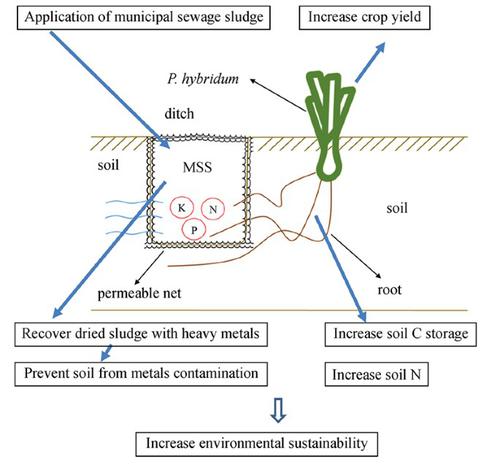Frontiers of Environmental Science & Engineering ( IF 6.1 ) Pub Date : 2020-08-18 , DOI: 10.1007/s11783-020-1314-1 Xianke Lin , Xiaohong Chen , Sichang Li , Yangmei Chen , Zebin Wei , Qitang Wu

|
The treatment and disposal of municipal sewage sludge (MSS) is an urgent problem to be resolved in many countries. Safely using the nutrients within MSS to increase crop yield and enhance the fertility of poor soil could contribute to achieving sustainable development. An indirect use of MSS in ditches alongside Pennisetum hybridum plants was studied in field plots for 30 months and the contents of heavy metals and macronutrients were monitored in soil, sludge and plant samples. We found that the yield of P. hybridum was significantly increased by 2.39 to 2.80 times and the treated plants had higher N content compared with no sludge. In addition, the organic matter (OM) and N contents in the planted soil increased significantly compared with the initial soil. The OM content in the planted soil of the MSS treatment was 2.9 to 5.2 times higher than that with no sludge, and N increased by 2.0 to 3.8 times. However, MSS had no significant effect on the N, P and K contents in the soil at the bottom of the MSS ditch, and the content of heavy metals (Cd, Pb, Cu and Zn) were also within the safe range. Moreover, the moisture content and phytotoxicity of MSS after this indirect use were reduced and the heavy metal contents changed little, which is favorable to the further disposal of recovered MSS. Therefore, this indirect use of MSS is beneficial to agricultural production, soil quality and environmental sustainability.
中文翻译:

用于回收重金属的污水污泥沟可提高作物产量和土壤环境质量
城市污水污泥的处理和处置是许多国家亟待解决的问题。安全地利用MSS内的养分提高作物产量并提高贫瘠土壤的肥力可有助于实现可持续发展。在田间地块研究了杂草狼尾草与沟渠一起间接使用MSS的情况,历时30个月,并对土壤,污泥和植物样品中的重金属和大量营养素含量进行了监测。我们发现P. hybridum的产量与无污泥相比,处理后的植株的氮含量显着提高了2.39倍至2.80倍,并且处理过的植物的氮含量更高。此外,与初始土壤相比,种植土壤中的有机质(OM)和N含量显着增加。MSS处理的种植土壤中的OM含量比无污泥的土壤高2.9到5.2倍,N增加2.0到3.8倍。然而,MSS对MSS沟渠底部土壤中的N,P和K含量没有显着影响,重金属(Cd,Pb,Cu和Zn)的含量也处于安全范围内。而且,间接使用后MSS的水分含量和植物毒性降低,重金属含量变化很小,这有利于进一步处理回收的MSS。因此,











































 京公网安备 11010802027423号
京公网安备 11010802027423号